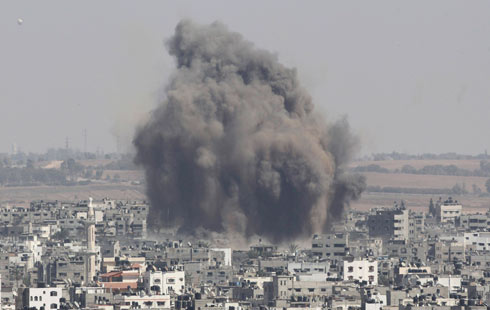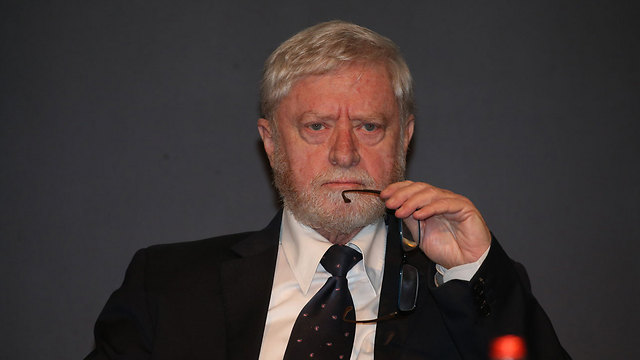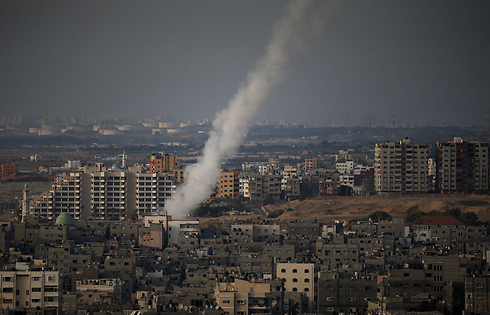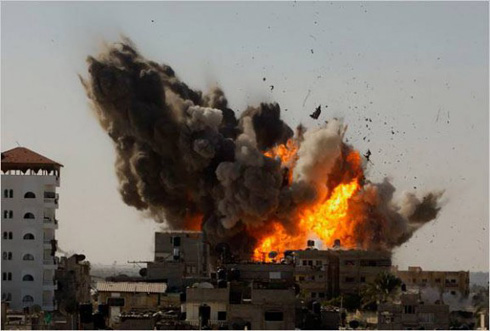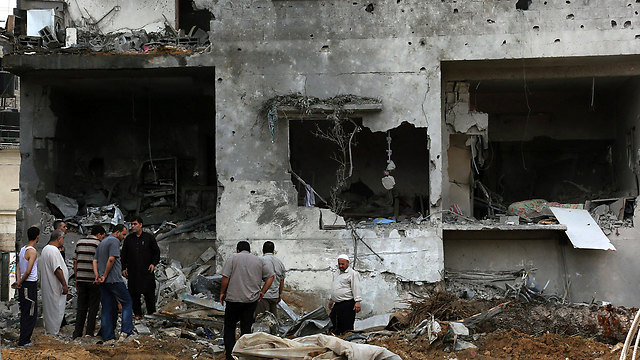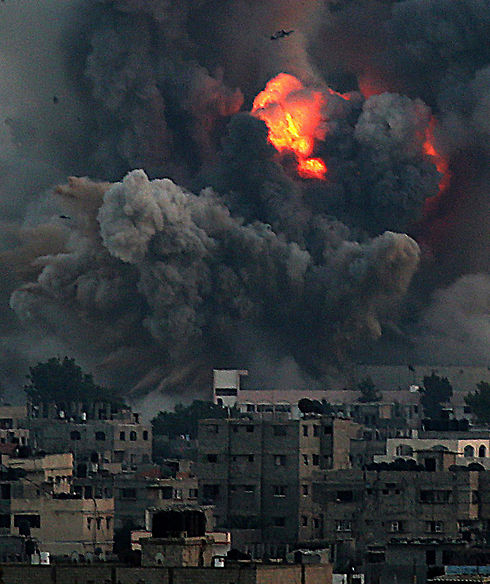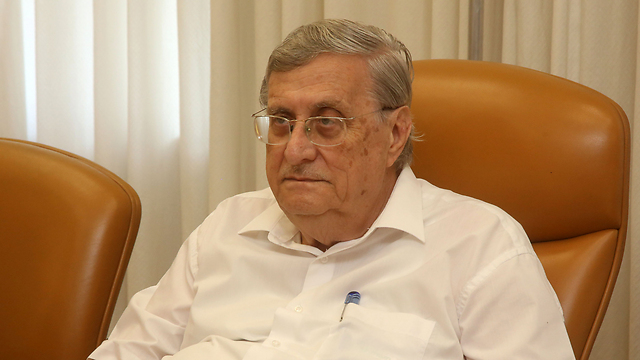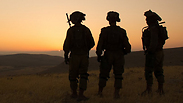
State comptroller finds faults in IDF's handling of international law
4 years after Operation Protective Edge, report by State Comptroller Shapira exposes faults in implementation of international law on conduct of hostilities during army operations amid uninvolved civilians; 'General Staff operational debriefing mechanism not fully consistent with recommendation of Turkel Commission. Its establishment was carried out without complete and orderly preparation and without an orderly work procedure,' report found.
State Comptroller Yosef Shapira found faults in IDF instruction of soldiers and officers on international humanitarian law as it pertained to military operations in the midst of uninvolved civilians, despite High Court orders to do so, according to a chapter on the international legal aspects of Operation Protective Edge in a report published Wednesday.
"The General Staff operational debriefing mechanism (was) not fully consistent with the recommendation of the Turkel Commission. Its establishment was carried out without complete and orderly preparation and without an orderly work procedure," the report said.
The Turkel Commission was appointed by the government in June 2010 as an Independent Public Commission—headed by Supreme Court Justice (ret.) Yaakov Turkel—to examine "whether the mechanism for examining and investigating complaints and claims raised in relation to violations of the laws of armed conflict, as conducted in Israel generally, and as implemented with regard to the present incident, (the maritime incident of 31 May 2010), conforms with the obligations of the State of Israel under the rules of international law."
The report was, in fact, the state comptroller's fourth on the 2014 Gaza Strip operation. The current report, irregularly also published in English, dealt with the degree the IDF's operations during Protective Edge conformed to international law.
In the chapter dealing with the IDF's preparations to minimize the possibility of harming uninvolved civilians in the fighting in the two years preceding Protective Edge, Shapira found that the army had yet to implement in its exercises the possible ramifications of such an extensive number of potential civilian casualties during the attack, in relation to its ability to attain the operation's military and political objectives.
Furthermore, the state comptroller found that the program for the provision of humanitarian aid to the Gaza Strip's civilian population did not detail the requisite modifications for humanitarian treatment of the populace during hostilities in the West Bank and in the northern arena.
As for the National Security Council, it was found that it did not examine—within the framework of comprehensive staff work and together with all the relevant parties—the international consequences that may result from harm to uninvolved civilians, and its possible effects on the IDF's ability to realize its objectives in combat.
The state comptroller's report also touched on the the Hannibal orders on the eve of Operation Protective Edge and in the course thereof.
The Hannibal order is a General Staff Order issued by the Operations Directorate, intended to regulate the operational orders for preventing the abduction of a soldier or a civilian and to thwart it while in progress.
The order expresses the General Staff policy on the manner of handling by the IDF of an abduction of a soldier or a citizen, from the stage of preparation, in its course and up to the point at which the abduction was prevented or the contact with the abductors was cut off, on the basis of a chain of command required to employ firepower.
While the General Staff order was amended in October 2013—following staff work and the approval of the attorney general—the Southern Command's order and the Gaza Division's order were not compatible with one another, or with the General Staff order.
According to their phrasing at the time, the report found, the command and division Hannibal orders could have been interpreted in various ways with respect to the terms that describe the value of an abducted person's life. This could have led to different interpretations of the orders by different bodies in the IDF.
The IDF did not verify that all the orders derived from the General Staff Hannibal order included the amendment approved by the attorney general and that their wording is identical to the General Staff Hannibal order, the report concluded.
Report raises concerns of lack of adequate reporting
State Comptroller Shapira also examined that implementation of the Turkel Commission's conclusions—founded after the events aboard the Mavi Marmara in 2010.
During a state of emergency or an armed conflict, Shapira found, a violation of the rules of international law may occur as a result of an operational action that requires reporting according to the rules of international law.
"Although the IDF's new reporting procedure is expanded and detailed, it does not require reporting an incident of unintentional harm to civilians unless it involved extensive harm. This raises a concern that no report will be given regarding incidents that should be examined even when the harm caused to civilians was not deliberate," the report said.
In an article relating to "fact-finding assessment" (FFA), Shapira found flaws regarding the efficiency and expediency of the mechanism's work both in collecting the findings and in the documentation of the information collected.
However, the audit found that the mechanism did its work in good faith and with a sincere desire to carry out a complete and thorough FFA and to arrive at the truth.
On the same matter, Shapira expounded that, "The regulation of the FFA mechanism in the same directive regulating the General Staff operational debriefing mechanism, and the integration of the FFA mechanism within the organizational framework of the General Staff operational debriefing mechanism, are not fully consistent with the recommendation of the Turkel Commission to establish a 'separate mechanism in order to conduct a fact–finding assessment.'"
Furthermore, the report said, the mechanism was established quickly, ad hoc, only after Operation Protective Edge began. Its establishment was carried out without complete and orderly preparation, without an orderly work procedure and without the early appointment of the officials in the mechanism, which caused difficulties in its work.
The work of the FFA teams in the field, Shapira added, did not include legal advisers, and only some of the first FFA teams were assigned (Criminal Investigation Division) investigators, whose involvement in the FFA teams was partial and limited.
These functionaries, he said, were meant to ensure skillful handling of assessing possible discrepancies between accounts and appropriate documentation of the statements of those being questioned, in order to ensure that the fact-finding assessment will facilitate a criminal investigation, if launched, and not harm it.
Flaws found in FFA mechanism's work
In the examination of 20 files handled by the FFA mechanism, flaws were found that could damage the thoroughness and efficiency of its work, such as the lack of documentation of the debriefing procedure.
It was further found that in more than 80 percent of the cases that were transferred to the FFA mechanism, the length of time required to complete the examination of events exceeded, sometimes significantly, the timetables set forth in the Operations Directorate order 4.8 on the subject of "The debriefing and implementation of the lessons." The prolongation of the examination, the state comptroller noted, may damage evidence and thus hamper a future investigation, if launched.
On the implementation of the Turkel Commission's conclusions, Shapira wrote that the State of Israel should continue to prepare itself thoroughly, optimally and in a timely fashion, and not wait for a time of crisis, to comply with the requirements of international law and deal with the legal campaign being waged in this arena.
"This issue is also of significant importance because of the long-term effects, even after the end of hostilities, arising from the military campaign, especially concerning the employment of firepower," the state comptroller wrote.
"Following the publication of the Turkel II Report, which was recognized by the international community, and after the Israeli government decided to adopt the recommendations made by the Ciechanover team, the Israeli government and the IDF should act without delay to implement these recommendations and take steps to amend the flaws regarding the mechanism's work noted in this report," he concluded.
The Ciechanover team, led by Dr. Joseph Ciechanover, examined the implementation of the conclusions found in the second Turkel report.
Concluding the chapter, State Comptroller Shapira stated that, "A humanitarian disaster among the civilian population in times of war may, in addition to its moral significance, constitute a breach of the State of Israel's obligations on the international level and cause serious damage to the image of the State and its international standing, and may even have legal implications.
"Such a disaster may (also) affect the IDF's ability to achieve its operational goals."










